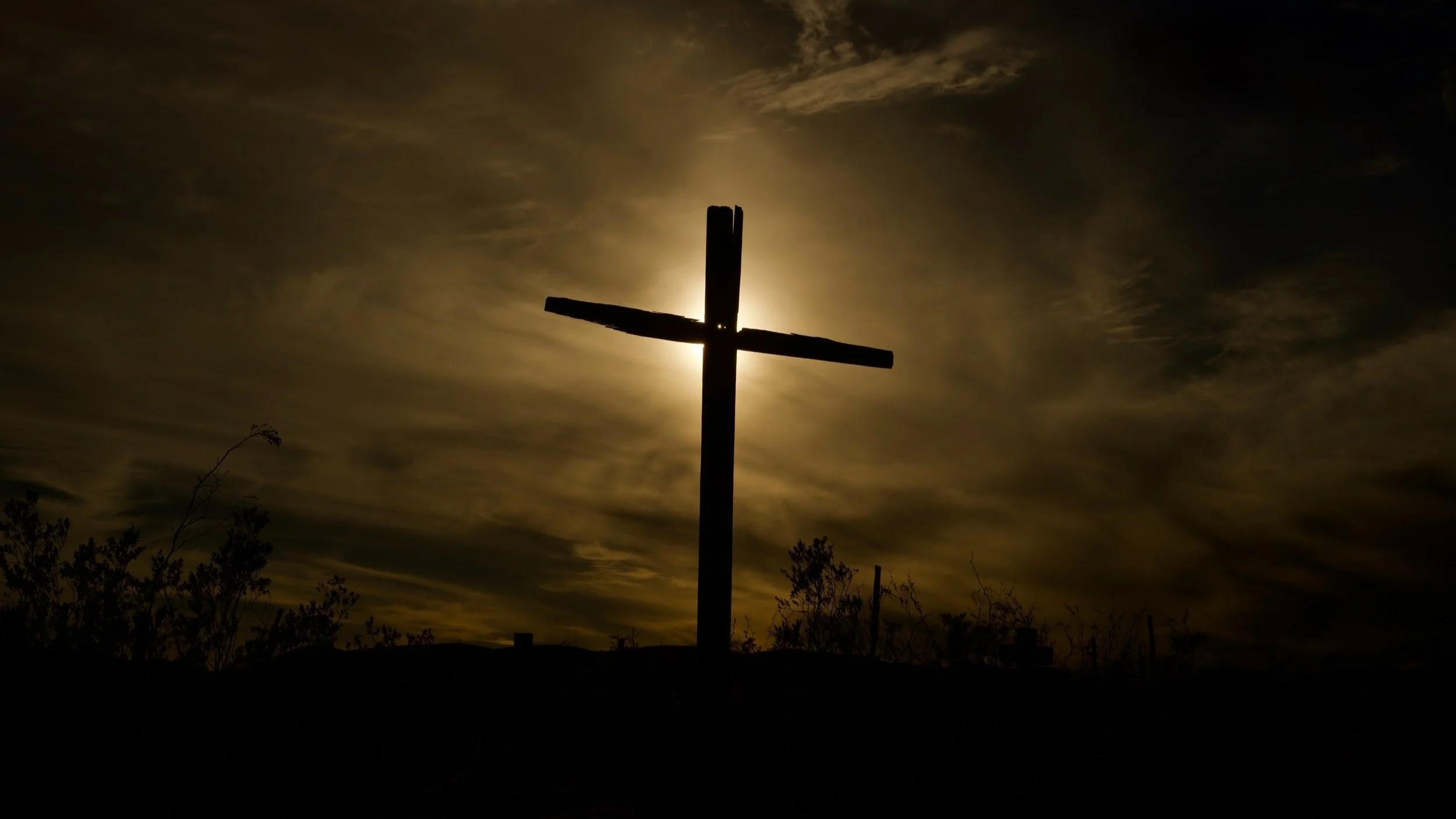A community that is seeking to spread love to the world has no space for fear in it.
Read moreRethinking the Fall
We’ve never seen any visions of the Kingdom that didn’t take on some of the attributes of this broken world we live in.
Read moreRethinking Salvation
If Jesus came to town teaching something that seemed to threaten my understanding of the Bible, or my ministry, how would I react?
Read moreThe God who Dies
As if it’s in his very nature to do so.
Read moreOn Guns and Self-Defense
Reflections from a Tae Kwon Do Master
Read moreJesus' Call to Worship
Kendall Smith, No-Div
Kendall is an elementary science teacher and an avid lover of books, nature, and long walks. She is easily distracted by thunderstorms and loves a good conversation over coffee.
One of the most quoted portions of the crucifixion story is Jesus’ cry, “My God, my God, Why have you forsaken me?” (Matt. 27:46; Mk. 15:34) It’s an understandable lament as you are hanging on a cross, innocent. It’s something we can relate to in seasons where we feel God has abandoned us. But it creates an awkward theology when we start to wonder, Did God really leave Jesus on the cross?
The explanations surrounding what Jesus’ death actually accomplished are many. Experts debate and write books. Pastors spend their Holy Week each year longing to communicate the full weight of Jesus’ work on the cross. But how would Jesus describe it? Do we have any record of that?
Jews in Jesus’ day were expected to memorize large portions of the Torah and Psalms. When a teacher or rabbi would quote a phrase or portion of Scripture, it would often call up the entire passage or story to the listener’s mind. Perhaps Jesus cries these words not to protest His Father’s absence, but to call to mind in those who were listening the rest of the Psalm. This phrase is the first line of Psalm 22. It is a powerful psalm when we read it in its entirety. (For a powerful listening experience, close your eyes and listen as Emily P. Freeman reads it aloud.) Imagine these, as Jesus’ last words. Enter into the story that Jesus was living. Experience the call to worship that He offered to those left standing as He breathed his last breath. Jesus, after all, is Israel’s True Hope and Consolation.
Psalm 22 (A David Psalm)
1 My God! My God,
why have you left me all alone?
Why are you so far from saving me—
so far from my anguished groans?
2 My God, I cry out during the day,
but you don’t answer;
even at nighttime I don’t stop.
3 You are the holy one, enthroned.
You are Israel’s praise.
4 Our ancestors trusted you—
they trusted you and you rescued them;
5 they cried out to you and they were saved;
they trusted you and they weren’t ashamed.
6 But I’m just a worm, less than human;
insulted by one person, despised by another.
7 All who see me make fun of me—
they gape, shaking their heads:
8 “He committed himself to the Lord,
so let God rescue him;
let God deliver him
because God likes him so much.”
9 But you are the one who pulled me from the womb,
placing me safely at my mother’s breasts.
10 I was thrown on you from birth;
you’ve been my God
since I was in my mother’s womb.
11 Please don’t be far from me,
because trouble is near
and there’s no one to help.
12 Many bulls surround me;
mighty bulls from Bashan encircle me.
13 They open their mouths at me
like a lion ripping and roaring!
14 I’m poured out like water.
All my bones have fallen apart.
My heart is like wax;
it melts inside me.
15 My strength is dried up
like a piece of broken pottery.
My tongue sticks to the roof of my mouth;
you’ve set me down in the dirt of death.
16 Dogs surround me;
a pack of evil people circle me like a lion—
oh, my poor hands and feet!
17 I can count all my bones!
Meanwhile, they just stare at me, watching me.
18 They divvy up my garments among themselves;
they cast lots for my clothes.
19 But you, Lord! Don’t be far away!
You are my strength!
Come quick and help me!
20 Deliver me from the sword.
Deliver my life from the power of the dog.
21 Save me from the mouth of the lion.
From the horns of the wild oxen
you have answered me!
22 I will declare your name to my brothers and sisters;
I will praise you in the very center of the congregation!
23 All of you who revere the Lord—praise him!
All of you who are Jacob’s descendants—honor him!
All of you who are all Israel’s offspring—
stand in awe of him!
24 Because he didn’t despise or detest
the suffering of the one who suffered—
he didn’t hide his face from me.
No, he listened when I cried out to him for help.
25 I offer praise in the great congregation
because of you;
I will fulfill my promises
in the presence of those who honor God.
26 Let all those who are suffering eat and be full!
Let all who seek the Lord praise him!
I pray your hearts live forever!
27 Every part of the earth
will remember and come back to the Lord;
every family among all the nations will worship you.
28 Because the right to rule belongs to the Lord,
he rules all nations.
29 Indeed, all the earth’s powerful
will worship him;
all who are descending to the dust
will kneel before him;
my being also lives for him.
30 Future descendants will serve him;
generations to come will be told about my Lord.
31 They will proclaim God’s righteousness
to those not yet born,
telling them what God has done.
This is the word of the Lord; Thanks be to God.
Jesus Failed
The Church Needs A Timeout
Just to think about what it’s done.
Read morePeace on Earth
Is it possible?
Read moreThe Meaning of Christmas
Tyler Johnson, MDiv
Tyler is a pastor, a teacher, and a former NASA engineer. He loves to explore truth through God’s word and God’s works. He lives in Kansas with his wife and four children and spends what little free-time he has pondering the mysteries of light.
This is the first week of Advent in the church. It begins the time of anticipation of, not simply opening a bunch of presents at Christmas, but the celebration of the birth of Jesus. And of course, that too is easily misconstrued. Advent is a time of waiting and anticipation and remembering of the greatest event in human history: the Incarnation of God.
My favorite Advent hymns are those that are played in a minor key. This is how I experience Advent and Christmas. There is joy and love and hope and peace, but it is always marred and distorted by the profusion of consumeristic advertisements and efforts at secular meaning making. There is the celebration of what God has done, and the desire for God to complete the work. Advent is a reminder that we live in between these events.
The rituals of Advent and Christmas are great. We seek to mark the season off as special as different than ordinary time. My family cuts down a Christmas tree and decorates it. We decorate the house both inside and out. We bake special treats, watch certain movies. I love the rituals. But still the season seems to lack something.
Upon reflection, I’ve come to the conclusion that the reason for my dissonance during Advent is that none of these things seem to adequately capture the true meaning of Christmas, by which I am referring to the depth of the Incarnation. And I’m fairly certain that this is inevitable.
C.S. Lewis calls the Incarnation, “the central event in the history of the Earth - the very thing that the whole story has been about.” That’s a big deal. Far bigger than any nativity scene, or lights display, or Christmas Eve service can capture. The Incarnation is indeed a paradox. God becoming man, the Creator becoming a part of the creation, omnipotence depending on a young woman for life, omniscience being taught: none of it makes sense. And yet either it happened, or the whole Christian faith is a farce.
The meaning of the Incarnation cannot be captured easily. It’s paradoxical nature rejects any satisfying scientific or philosophical explanation, helpful though these can be. In many ways it is unreasonable or irrational. This doesn’t mean that the Incarnation isn’t true. It is just a recognition that truth and meaning are not the same thing and they derive from different places.
“Reason is the natural organ of truth; but imagination is the organ of meaning.” So argued C.S. Lewis. And I think he is absolutely right. Truth is found through the proper use of our rational functions. But meaning is found through the proper use of our imaginative functions. All the facts and data in the world cannot produce one ounce of meaning. That comes from a different place, from story, from myth, from the functions of the imagination.
I’m beginning to think that the goal of Advent is not just reasserting the facts of the story, not just making sure that Christ is in Christmas, but actually allowing the Incarnation to work on our imagination, allowing it to extend beyond Christmas. The paradoxical reality of God becoming man should invigorate our imaginations to consider just what kind of universe we live in, what it means to be human, what is the purpose of life, and all kinds of other big (and little) questions. It should color our perception of what is and what is possible.












